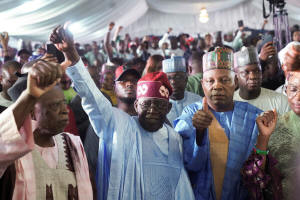Nigeria's Tinubu defends win in disputed presidential poll
 Send a link to a friend
Send a link to a friend
 [March 01, 2023]
By Felix Onuah and Camillus Eboh [March 01, 2023]
By Felix Onuah and Camillus Eboh
ABUJA (Reuters) -Nigeria's new president-elect, Bola Tinubu, called on
citizens to unite around him on Wednesday, as he defended the integrity
of the national election he won amid a bitter dispute over the results.
Both of the two main opposition parties have rejected the outcome as
fraudulent, and said they would challenge the results in court. The
bitter dispute has raised fears of violence in Africa's most populous
nation and leading energy producer, which has a long history of
electoral violence.
In past polls, street gangs with loyalty to Tinubu in the commercial hub
of Lagos have fought pitched battles with gangs loyal to rival parties.
"I am very happy I have been elected the president of the federal
republic of Nigeria," Tinubu said to cheers in Abuja. "This is a serious
mandate. I hereby accept it."
He now faces a litany of national problems, including Islamist
insurgencies in the northeast, armed attacks, killings and kidnappings,
conflict between livestock herders and farmers, cash, fuel and power
shortages, and deeply entrenched corruption.
The Independent National Electoral Commission (INEC) said Tinubu
garnered 37%, or 8.79 million votes, in the weekend election, ahead of
main opposition challenger Atiku Abubakar's 29%, or 6.98 million votes.

Peter Obi, an outsider popular with younger and more educated urban
voters, won 25%, or 6.1 million votes.
A candidate can win by getting more votes than any of their rivals,
provided they get 25% of the vote in at least two-thirds of the 37
federal territories - that is the 36 states and the federal capital
territory of Abuja, which Tinubu managed to do.
LOW TURNOUT, LOW TRUST
With total votes cast at just under 25 million, out of 87 million people
with voter identity cards and eligible to vote, turnout was only 29% -
low, even by Nigerian standards. The 2019 election saw 35% turnout.
At least some of them were unable to vote due to malfunctioning of voter
card reading machines.
Nigeria's election was meant to be its fairest and most open contest to
date. But the electoral process encountered problems, owing to new
technology that did not function well and seemed to overwhelm Nigeria's
notoriously inadequate communications network. That undermined trust in
the whole process.
"In the eyes of God, the man (Tinubu) is not the winner," trader Mercy
Efong said in Akwa, in Obi's home state of Anambra.
[to top of second column]
|

Bola Ahmed Tinubu reacts after he was
declared winner in Nigeria's presidential election at the Party's
campaign headquarters, in Abuja, Nigeria March 1, 2023. REUTERS/Marvellous
Durowaiye.

The INEC had promised to upload results from each polling unit to
its website in real time, but most units were unable to do so
immediately. That was not a legal requirement, but it meant results
had to be collated manually inside ward and local government
counting centres as in previous polls, reneging on a policy that was
meant to improve transparency.
"President Buhari said that he would do free and fair election (but)
INEC is now turning everything upside down," said rickshaw driver
Nedu Chukwunata, referring to the outgoing president.
"We want justice in Nigeria; we want democracy here in Nigeria ...
we want our voice to be heard we are tired of corruption," said
Chukwunata, who had parked his yellow rickshaw on a sandy patch of
ground in Akwa.
'CREDIBLE ELECTION'
Observer missions have criticised the problems as the result of poor
planning.
"I commend INEC for running a credible election no matter what
anybody says," Tinubu said. "The lapses that were reported, they
were relatively few in number and were immaterial to affect the
final outcome of the election."
President Muhammadu Buhari, also from the All Progressives Congress
(APC), congratulated his successor.
"Elected by the people, he is the best person for the job. I shall
now work with him and his team to ensure an orderly handover of
power," he said in a statement.
As Lagos governor, Tinubu won praise for partially fixing some of
the cities problems, including reducing violent crime, waste
collection and traffic.
The 70-year-old has, however, sometimes appeared frail in public,
slurring his speech, answering questions with platitudes and
skipping several campaign events, leaving some to doubt how
effective or dynamic he will be as leader.
(Additional reporting by Ahmed Kingimi in Maiduguri, Hamza Ibrahim
in Kano, Macdonald Dzirutwe and Tim Cocks in Lagos; Writing by Tim
Cocks; Editing by Alex Richardson)
[© 2023 Thomson Reuters. All rights
reserved.]This material may not be published,
broadcast, rewritten or redistributed.
Thompson Reuters is solely responsible for this content.
 |